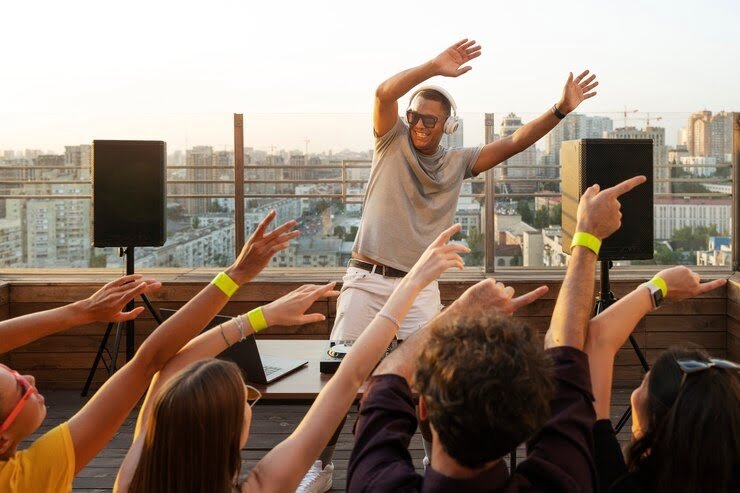Music has a magical way of bringing people together. Whether it’s through a concert, festival, or other live event, there’s an undeniable energy that unites the crowd and creates lasting memories. In this digital age of streaming music and virtual experiences, live events continue to have an unparalleled impact that technology simply can’t replicate.
Introduction to Live Events
Live events are communal experiences of music, art, culture or entertainment that bring large groups of people together in one physical location. Unlike recorded or broadcast events, live events unfold in real-time and offer a shared feeling of anticipation and participation that uniquely bonds the audience.
While live events can include theatre, dance, comedy shows, and more, some of the most iconic and impactful live events are centered around music. Concerts, festivals, and other musical happenings allow fans to connect with artists and each other through the universal language of music.
This article will explore the allure and influence of live musical events. We’ll examine the emotional resonance of concerts, the diverse cultural celebration of festivals, and the logistics involved in planning successful events. Whether you’re a music lover, an avid festival-goer, or simply appreciate the craft of excellent event production, read on to learn more about the communal joy and magic of live music experiences.
The Impact of Live Events
More than just concerts, live events have traditionally been places for people to gather, express themselves, and take part in impactful cultural and social moments. Their influence extends far beyond entertainment value.
The Emotional and Communal Nature of Live Events
- Live events offer a shared emotional experience that can’t be replicated through recordings or broadcasts alone. Hearing your favorite artist live or dancing alongside thousands of strangers creates memories and connections that deeply resonate.
- Unlike passive listening, live events are interactive, participatory experiences that make the audience feel truly invested in the event. From singing along to holding up lighters and cellphone flashlights, concertgoers become part of the experience.
- Live events provide a feeling of community and belonging, as complete strangers bond over their shared passions. Music especially has a way of dismantling social barriers.
- Epic, iconic live events like Woodstock represent cultural touchstones that embody the spirit and ethos of a generation. They take on historical and societal significance.
- For marginalized groups, live events can be platforms for social and political commentary and catalysts for change. Artists convey messages of empowerment and invoke activism.
By facilitating human connection and shared cultural experiences, live events wield an influence that far exceeds entertainment. Their communal energy creates bonds that last well beyond the event itself.
Examples of Impactful Live Events
- Woodstock 1969 – The famous rock festival came to symbolize hippie counterculture, free expression, and the power of peace & music. It set the standard for future festivals.
- Live Aid 1985 – This 16-hour charity concert supporting famine relief in Africa was globally broadcasted and featured headliners like Queen and U2.
- Tribute in Light – An annual lights display remembering 9/11 victims, viewable by millions in NYC. A solemn yet unifying live event.
- Obama’s Inauguration – Over 1 million attended Obama’s 2009 inauguration, recognizing its historical significance as a unifying cultural moment.
These examples illustrate how live events take on important social, political, and cultural meaning that profoundly impacts audiences well beyond the event lifespan.
Concerts: A Journey of Emotions
From intimate club shows to sold-out stadium spectacles, concerts offer an unrivaled emotional resonance and nostalgic value that keeps fans coming back.
The Electric Atmosphere of Live Concerts
- The excitement and anticipation in the air is palpable even before the artist takes the stage. Eager fans may camp out overnight or spend hours waiting in line, hungry for the show to start.
- Hearing the first notes as the lights go down elicits ecstatic cheers and screams from the crowd. Strangers exchange grins, unified in happy disbelief that the moment has finally arrived.
- Singalongs to favorite tracks encourage crowds to belt out lyrics together, creating a powerful shared experience. Concerts allow fans to physically participate in the music.
- Crowd energy ebbs and flows throughout the show, with bass drops, choruses, and encores each whipping up the audience into a frenzy. The shared emotions are infectious.
- Light shows, pyrotechnics, and visuals complement the music to create an immersive sensory experience that dazzles the eyes as well as the ears.
The Nostalgic Value of Concert Memories
- Concerts create indelible memories tied to special moments in life. Certain shows become emblematic of youth, early romance, road trips with friends, and formative experiences.
- Hearing a favorite song takes you back to the exact moment you first heard it live. Years later, tuned into the radio or a playlist, it brings you right back.
- Seeing the same artist perform over the years becomes a marker of personal growth and changing life seasons. Their music offers comfort but also perspective.
- Keepsakes like ticket stubs, t-shirts, and setlists become cherished mementos that let you relive the experience and its associated memories.
- Capturing photos and videos lets you savor special moments and share highlights with other fans who get the excitement. YouTube also enables fans globally to enjoy shows vicariously.
The Emotional Resonance of Live Music
- Live interpretations often reveal new depth and meaning to familiar songs. The unfiltered vocals and energy amplify their intensity.
- Watching an artist pour their soul into singing creates a profound connection. The transparency and emotion bind artist and fan.
- Covers and mashups allow artists to reinvent songs, offering surprising new takes on classics. Familiar melodies become fresh again.
- Jam bands and solo improvisation segments showcase artistry through musical storytelling and extended instrumentation.
- Seeing an artist live can turn casual fans into diehards. The power and passion displayed on stage forges an emotional bond.
Concerts represent experiences that stick with us and take on deeper meaning. Through the music’s energy and its ties to memories, concerts resonate on a profoundly personal level.
Festivals: Celebrating Diversity and Unity
Weekend-long music festivals have exploded in popularity, offering diverse genre options and a communal spirit of freedom. Despite grueling conditions, they remain bucket list experiences because of their inclusiveness and magic.
A Musical Smorgasbord
- Spanning rock, pop, rap, EDM, jazz, bluegrass, and more, festival lineups showcase top names in virtually every genre. They offer musical diversity under one banner.
- Eclectic bills allow fans to discover new artists and genres outside their wheelhouse. Festivals broaden musical horizons.
- Collaborations and supergroups form exclusively for festivals, often pairing acts fans otherwise wouldn’t experience together. Surprise sit-ins also delight crowds.
- Limited tour schedules make festivals prime opportunities to catch rare festival-only performances or reunion shows from older favorites. Exclusivity draws serious fans.
- Beyond music, festivals also deliver comedy, film, theater, performance art, and other entertainment. There’s constant action across all stages.
Together in Music: The Community of Festivals
- Free from the constraints of routine, fans bask in a judgement-free spirit of musical communion. Strangers become family.
- Festivals allow fans to fully immerse themselves in music and the scene. Attendees commit fully by camping on-site and staying for every act.
- For four days fans detach from the outside world and live entirely in the present. Daily stresses fade away.
- Everyone chips in to help their fellow fans. Sharing food and water, giving directions, making new friends – random acts of kindness abound.
- Lifelong bonds form over the shared experience of musical discovery, camping, long lines, and navigating festival life as one.
- Post-festival friendships flourish online as fans reminisce and continue discussing memories and discoveries from the weekend.
Signature Festivals and Their Distinct Flavors
- Coachella – Desert vibes, rare reunions, surprise guests, and major fashion statements converge at this trendsetting Indio festival.
- Lollapalooza – This Chicago-based event spans rock, hip hop, and EDM with a bustling Midwest energy and city skyline views.
- Stagecoach – California goes country with top Nashville stars, cowboy hats everywhere, and lots of BBQ at this Palm Desert festival.
- Electric Daisy – Over-the-top production, mind-blowing visuals, and earth-shaking bass define this flagship EDM festival in Las Vegas.
- Glastonbury – Epic performances on the Pyramid Stage and a funky freewheeling vibe characterize this beloved British music festival held on a dairy farm.
- New Orleans Jazz & Heritage Festival – “Jazz Fest” celebrates Louisiana culture with iconic regional food, parades, and both heritage and contemporary jazz acts.
- Bonnaroo – One of America’s first major multi-day camping festivals, this Tennessee event now draws crowds with jam bands, Americana, rock, hip hop, and more.
- SXSW – Initially launched as an indie music festival, South by Southwest has evolved into a massive annual event spanning music, film, tech, and innovation.
- Burning Man – Far more than just music, this experimental community thriving on self-expression and creativity draws festival-goers from around the world to Nevada’s Black Rock Desert.
Music festivals across genres manage to develop their own distinct flair and customs. Yet they all foster the same magical community spirit flowing from soundtracks that stir the soul.
Organizing Live Music Events
Behind all the fun and magic of live music events lies meticulous planning and coordination. Organizers must handle complicated logistics while keeping the artist’s vision at the center.
Key Elements of Organizing Live Music Events
- Booking talent – Securing artists who appeal to target audiences and fit within budget parameters. Lining up quality supporting acts.
- Venue selection and setup – Identifying locations suited for the genre, crowd size, acoustics and desired ambience. Overseeing stage, lighting, and AV.
- Permits and legalities – Navigating contracts, insurance, licenses, visas, and local regulations. Ensuring security and medical staffing meet guidelines.
- Vendor coordination – Recruiting and managing concession vendors, merchandise sellers, and other on-site services.
- Promotions – Marketing strategy across social media, print, radio, TV, email campaigns, and other channels. PR pitches to drive buzz.
- Budgeting – Realistically projecting all expenses from talent, venue, equipment, permits, insurance, staffing and balancing with expected revenue.
- Crowd management – Developing efficient entrance lines, exit plans, and patron flow throughout venue. Providing ADA access.
- Health and safety – Installing medical tents and protocols. Security to control entry, watch for overcrowding, and handle incidents.
Key Partnerships for Live Music Events
- Artists – Respecting creative visions and building collaborative relationships. Accommodating riders and contract terms.
- Venues – Partnering with locations suited to event scope and needs. Coordinating equipment, staffing and operational logistics.
- Vendors – Ensuring reputable, reliable vendors who provide quality products and service in high volume settings.
- Sponsors – Pairing with brands whose images align with event. Delivering promotions that offer value yet don’t infringe on experience.
- Local organizations – Teaming with police, hospitals, and community groups to plan safe, inclusive, and culturally enriching events.
The Critical Role of Planning
- Despite technology’s role in marketing and ticketing, live events fundamentally depend on rock-solid planning and logistics. The devil is in the details.
- With large crowds and moving parts, organizers must anticipate needs and prevent problems before they occur, always keeping safety front of mind.
- Pulling off live events requires passion, resilience, problem-solving skills and people skills. The job is exhilarating but demands nonstop diligence.
- When done right, seamless execution allows attendees to simply enjoy the event magic without disruptions or logistics headaches detracting.
- The reward for organizers comes in seeing joyful reactions to their vision. Great events start with one person’s dream backed by meticulous planning and hard work.
The Future of Live Events
Despite facing challenges today, live events will continue adapting to retain their magical appeal. The innate human desire for connection will sustain their role in culture.
Navigating Evolving Cultural and Technological Landscapes
- The pandemic dealt a crushing yet hopefully temporary blow to live events. Virtual concerts helped fill the void but lacked communal magic.
- Potential for another pandemic, new regulations, anxiety around crowds, and other changes make the live event landscape uncertain. Agility is key.
- Virtual and augmented reality open opportunities to blend digital with live events and reduce environmental footprints. But risks overcommercialization.
- Music festivals must grapple with sustainability concerns over waste, environmental damage, and local community impact.
- Corporate consolidation and skyrocketing expenses pressure middle-tier venues and festivals and make lineups increasingly homogeneous.
Why Live Events Will Endure
- Virtual experiences lack the visceral emotional punch and nostalgia of live events. People crave the authenticity and spontaneity.
- The FOMO of missing out on cultural moments and limited-time reunions will continue driving ticket sales. Exclusivity appeals.
- Humanity’s innate tribal nature and desire for community makes the shared connections of live events irreplaceable.
- New generations of artists, entrepreneurs, and changemakers will emerge to revitalize the live event landscape and pioneer fresh ideas.
- Live events have proven their resiliency time and again. With care and creativity, they can responsibly evolve to meet societal needs.
The Ongoing Magic of Live Music
- For all our differences, music has a unique way of dismantling barriers and convening people in euphoric harmony.
- At their best, live events lift attendees into a spirit of optimistic unity essential in difficult times. Light still needs darkness to shine.
- Regardless of age or background, favorite artists transport us back through music’s time machine. Their gifts inspire present gratitude.
- Though formats may change, live music will continue gathering humanity together, releasing our burdens, and reminding us we’re all one tribe.
Live events offer communal experiences that technology and recordings can’t replace. Their magic persists by adapting yet remaining rooted in music’s eternal power to stir emotion and unite us all. Though facing modern challenges, the sway of live music endures.








No Comment! Be the first one.